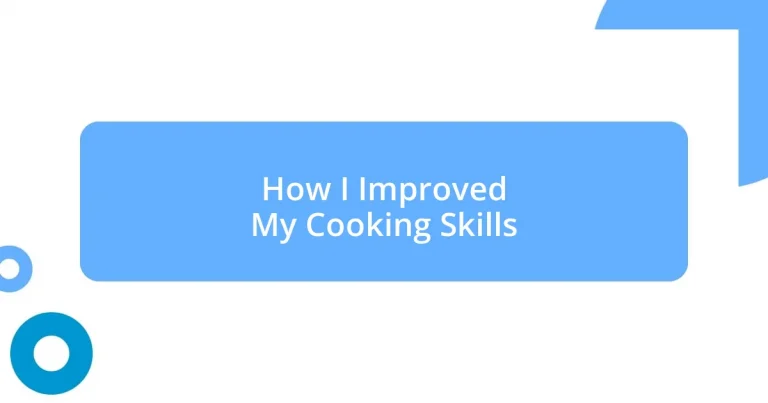Key takeaways:
- Identifying weaknesses such as knife skills and flavor balancing was essential for cooking improvement.
- Setting realistic cooking goals helped break down overwhelming tasks into manageable steps.
- Regularly exploring new recipes fostered creativity and expanded culinary skills.
- Seeking feedback from friends provided valuable insights and encouraged growth in cooking techniques.
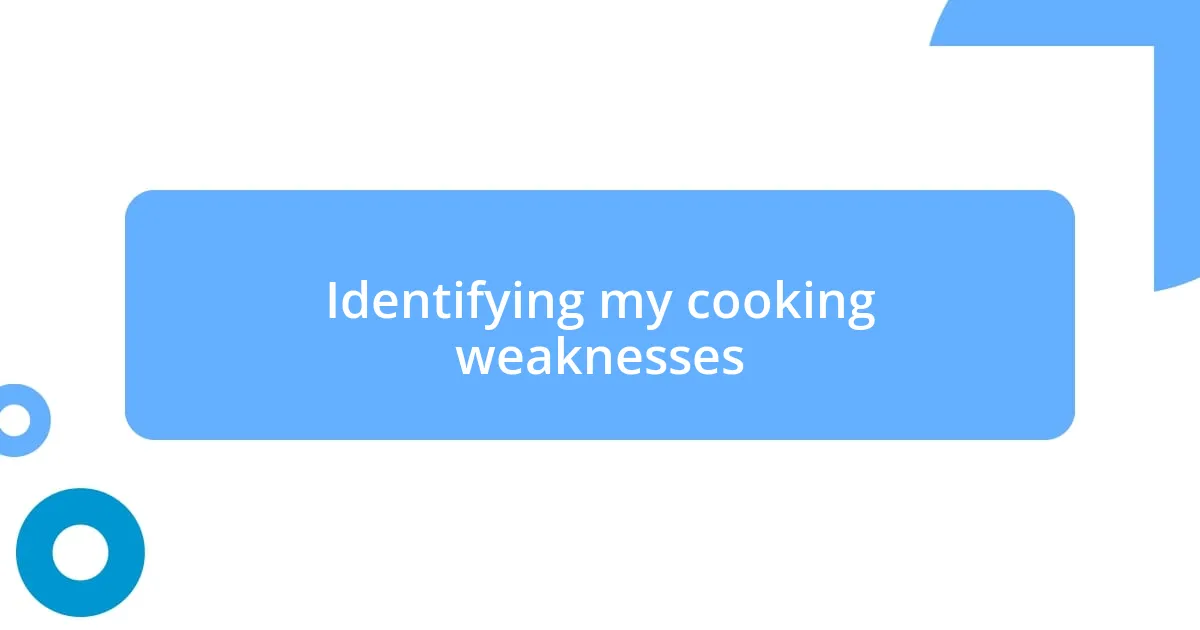
Identifying my cooking weaknesses
To truly improve, I had to take a hard look at my cooking weaknesses. I found that my knife skills were lacking, which often resulted in unevenly chopped ingredients—a small detail, but it made a big difference in how my dishes turned out. I often wondered why my food didn’t look or taste like what I saw online, and it became clear that mastering the basics was essential.
Another area where I struggled was my understanding of flavors and seasoning. I remember a night when I confidently made a pasta dish, only to realize it was bland. I had used too little salt and failed to balance the taste. Have you ever tasted something and thought, “This needs more?” That realization hit me hard, pushing me to explore herbs and spices more deeply.
Finally, my time management in the kitchen was another weakness that slowed me down. I once spent more time looking for utensils than actually cooking, which left me frazzled. What if there was a better way to organize my workflow? This nagging thought motivated me to rethink my approach, setting the stage for my cooking transformation.
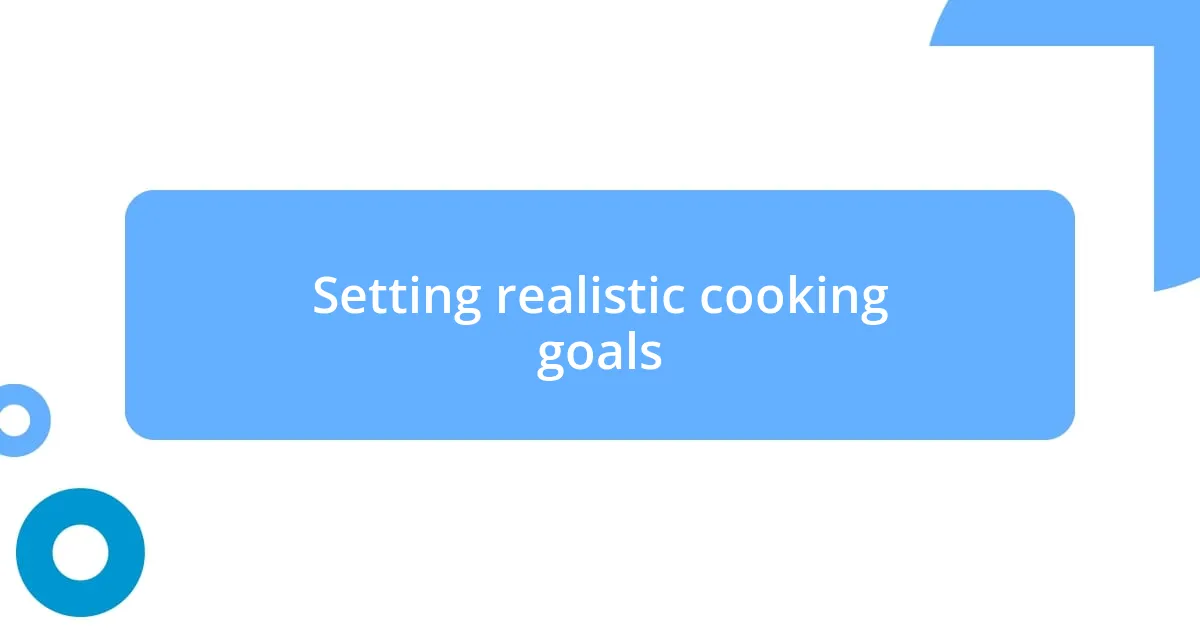
Setting realistic cooking goals
To improve my cooking skills effectively, I learned the importance of setting realistic goals. It feels overwhelming when you try to master everything at once. In my early days, my ambition led me to attempt gourmet recipes every weekend, which only frustrated me. Breaking these larger aspirations into smaller, attainable goals allowed me to celebrate each achievement without feeling defeated on the days when things didn’t go as planned.
Here are some strategies that worked for me:
- Start with basic techniques: Focus on one skill, like chopping or sautéing, until you feel comfortable.
- Limit your recipe scope: Choose a new dish once a week rather than trying to cook a four-course meal.
- Assess your time: Realistically plan how long each dish takes, including prep and clean-up—disappointments arise when expectations don’t match reality.
- Incorporate seasonal ingredients: Set a goal to cook with what’s fresh, which not only makes meals taste better but also keeps your planning simple.
- Experiment with flavors: Challenge yourself to try one new herb or spice each week instead of overhauling your entire pantry all at once.
This mindset shift made cooking feel less like a chore and more like a rewarding journey. I started enjoying the process rather than just the end result, which transformed my kitchen experiences significantly.
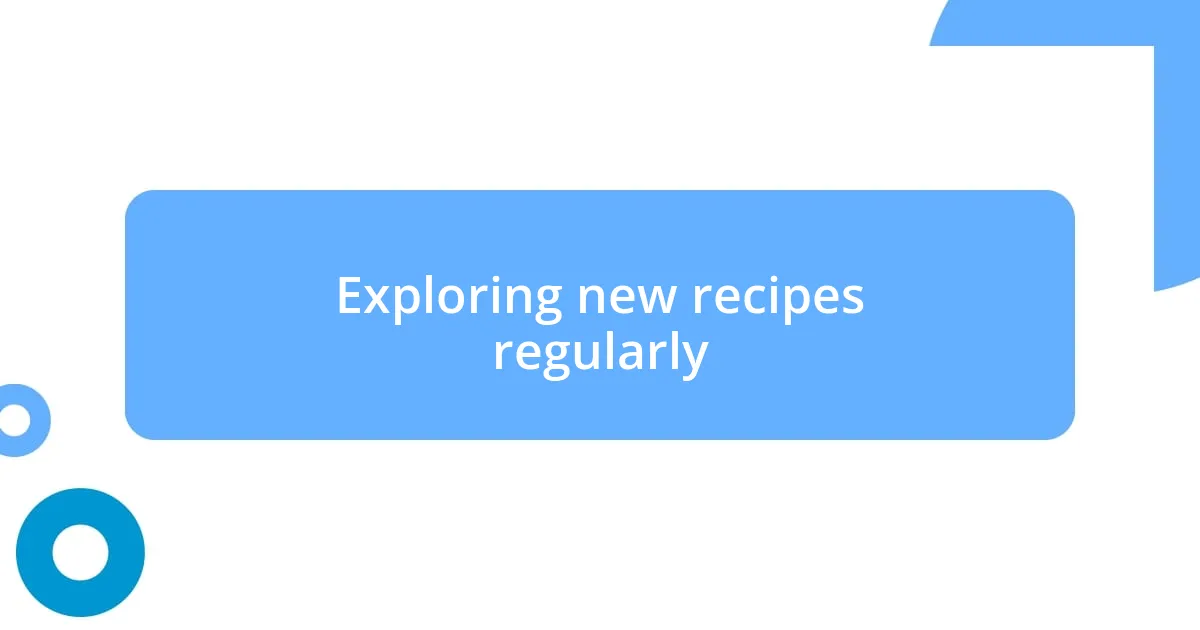
Exploring new recipes regularly
Exploring new recipes regularly has been a game-changer in my cooking journey. I remember the thrill of trying a new dish, like the first time I ventured into Thai cuisine with a Pad Thai recipe. The balance of sweet, sour, and savory flavors intrigued me. As I tossed the noodles, I could feel my excitement building. It wasn’t just about the food; it was about discovering new cultures and bringing their flavors into my kitchen. Every time I explore a new recipe, I find myself learning something unexpected, which keeps the experience fresh and engaging.
One of the best parts of regularly experimenting with different recipes is fostering creativity in my cooking routine. I often get inspiration from cooking shows or food blogs, and then I transition those ideas into my kitchen. For instance, I once tried a recipe for a Moroccan tagine that used spices I had never even heard of. The combination of cinnamon with savory ingredients blew my mind! As I tasted each spoonful, I realized that cooking is an art, and every recipe is a new canvas to work on. What dish might you try next that could open up a new world of flavors for you?
Lastly, I’ve come to appreciate the joy of trying recipes from various cuisines. It’s like a culinary adventure! There are days when I feel nostalgic for my grandmother’s Italian dishes and will try my hand at her classic lasagna. Other times, I lean into experimenting with Indian curries. Reflecting on the flavors of my childhood versus new spices opens my palate and expands my cooking skills. The thrill of trying something unfamiliar and possibly delightful keeps me motivated. Cooking new recipes is rarely just about the food; it’s about memories, experiences, and a journey that is uniquely mine.
| Aspect | Example Recipe |
|---|---|
| Cuisine Type | Thai |
| Key Ingredients | Noodles, shrimp, peanuts |
| Cooking Skills | Stir-frying, flavor balancing |
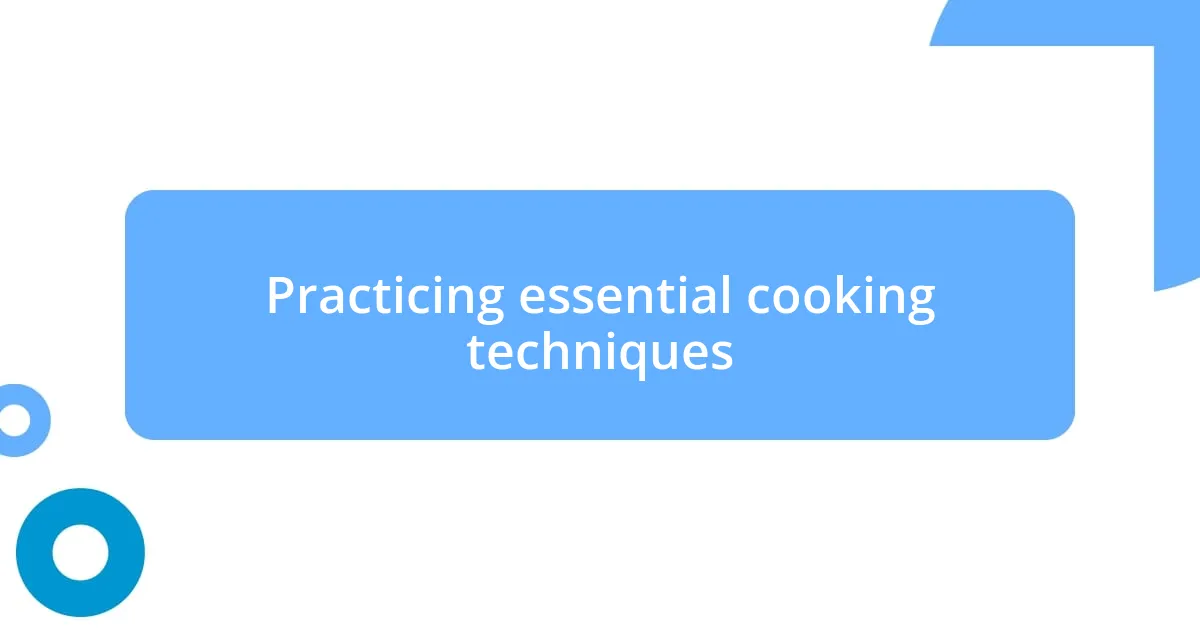
Practicing essential cooking techniques
Practicing essential cooking techniques was crucial for my growth in the kitchen. I remember the first time I tackled knife skills. I watched videos, practiced dicing vegetables, and felt an incredible sense of satisfaction as my cuts became more precise. It’s amazing how mastering that one technique changed everything. The confidence I gained not only made prep work quicker but also opened the door to trying more complex recipes.
Another important technique I honed was my sautéing method. Initially, I struggled with timing—those moments of overcooked onions or undercooked garlic were frustrating. But then, I started timing my ingredients, paying attention to how they changed as they cooked. This practice improved my palate, too; I learned to rely on smell and texture, which deepened my connection to the cooking process. Have you ever noticed the way a kitchen can transform with just the right amount of heat and seasoning? It’s like a symphony of flavors coming together!
Lastly, I embraced the art of balancing flavors. Once, I made a soup that tasted bland—until I added a splash of vinegar. The moment it hit my taste buds, the soup came alive! It made me realize how a simple addition can elevate a dish completely. This experience sparked my curiosity about balancing flavors across all my meals. Every time I cook now, I actively seek that perfect harmony—sweet, salty, sour, and bitter—and it has made my dishes more enjoyable for both me and my friends. What techniques have you tried that transformed your dishes into something extraordinary?
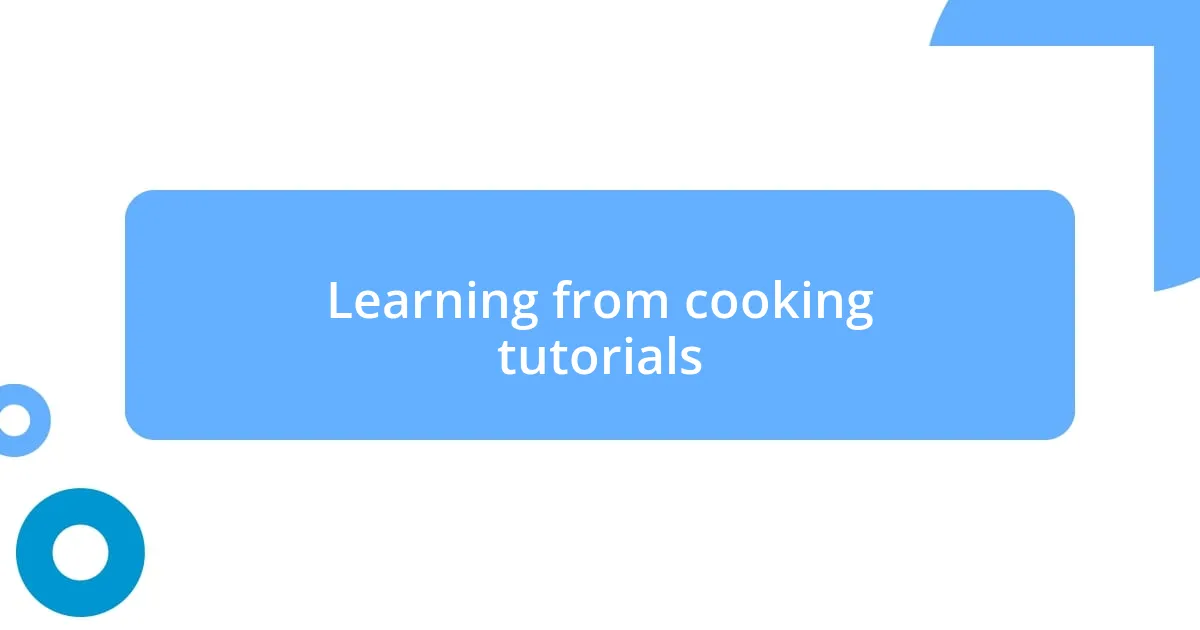
Learning from cooking tutorials
I often find cooking tutorials incredibly valuable. For instance, there was a time when I struggled with pasta. Watching a step-by-step video on how to cook it al dente changed everything for me. It was like I finally saw the secret! Now, every time I create a pasta dish, I appreciate the texture and flavor in a way I hadn’t before. Have you ever experienced that moment when a simple technique suddenly makes all the difference?
I also love the community aspect of these tutorials. Comment sections can be goldmines of tips and variations. I remember a video where the creator made a simple roast chicken but encouraged viewers to experiment with seasonings. That inspired me to try my favorite herbs, and the result was a meal that felt like a hug. What’s more satisfying than knowing you made a dish truly your own?
Additionally, I find that cooking tutorials cater to every skill level, making them accessible and engaging. One day, I watched a beginner’s guide to making a frittata. It seemed so straightforward, but the excitement I felt after creating something so tasty on my first try was exhilarating! It reminded me of the joy of cooking—it’s a wonderful blend of learning and creativity. What dish have you tackled recently that made you feel proud?

Seeking feedback from friends
Seeking feedback from friends was a game changer in my cooking journey. I can distinctly recall one evening when I hosted a dinner party. I presented a new dish, a Moroccan tagine, and asked my friends for their honest opinions. Their feedback—especially their suggestions on how I could enhance the spice level—was invaluable. It’s incredible how others’ perspectives can shine a light on what we might overlook ourselves.
There were times when I felt nervous about serving my creations. However, I made it a point to embrace those nerves and turn them into an opportunity for growth. One friend, in particular, had a discerning palate, and her constructive criticism helped me refine my techniques. After one meal, she pointed out that my pasta sauce lacked depth. Initially, I felt discouraged, but then I reflected on her feedback and realized it was a chance to experiment further. Have you ever had that moment when a friend’s insight sparked your creativity?
Sharing meals with friends not only builds connections but also fosters a collaborative cooking experience. I remember when a group of us got together for a potluck. Each dish was unique, reflecting our personalities and cooking styles. I took the chance to ask for thoughts on my spicy chili, and the collective encouragement motivated me to keep pushing boundaries in my cooking. Their genuine responses added a layer of joy to what I created. Isn’t it fascinating how feedback can turn a simple meal into a shared adventure?
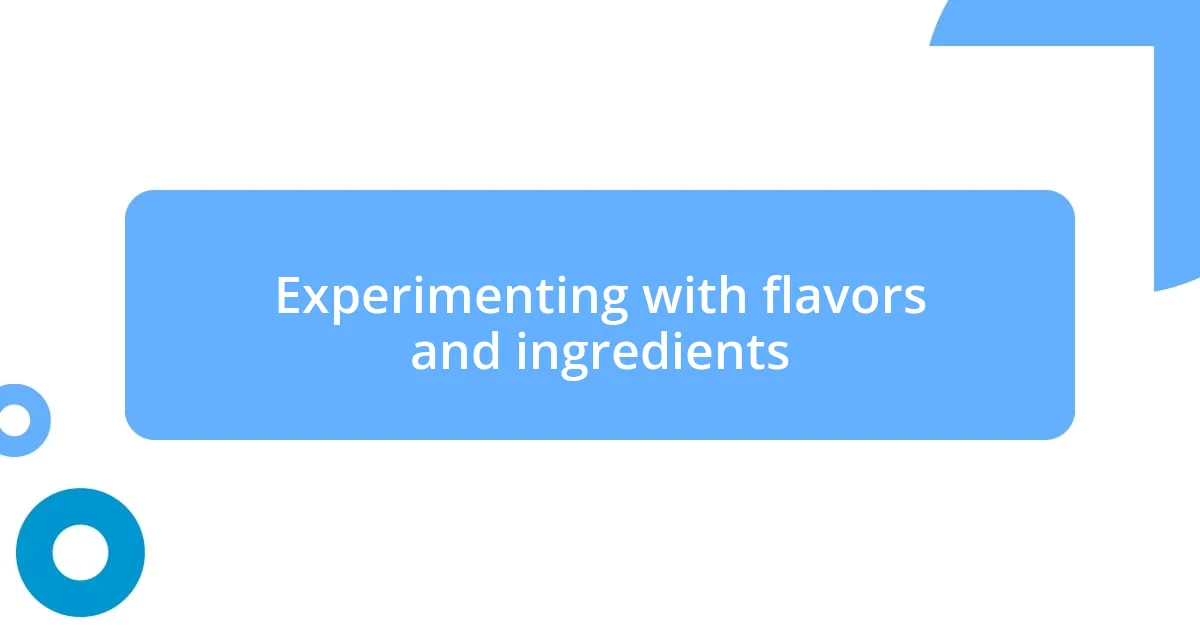
Experimenting with flavors and ingredients
Experimenting with flavors and ingredients opened an entirely new dimension in my cooking repertoire. I vividly remember the first time I decided to mix spices beyond the usual salt and pepper. I grabbed cumin, smoked paprika, and a touch of cinnamon, tossing them into a simple vegetable stir-fry. The moment I took my first bite, I felt like I had unlocked a treasure chest of flavors. Have you ever stumbled upon a combination that just blew your mind?
There was a pivotal moment for me when I began substituting ingredients based on what I had available. I once found myself without soy sauce while making a stir-fry, and out of curiosity, I used balsamic vinegar instead. The result? A tangy twist that turned an ordinary dinner into something truly memorable. This experience taught me the beauty of being flexible; improvisation can lead to delightful surprises in the kitchen. Have you ever had to get creative with what was in your pantry?
I’ve also made it a point to explore different cuisines to help broaden my palate. One weekend, I tried my hand at Indian cooking, focusing on the complex layering of spices. I remember my first attempt at a masala. The aroma that filled my kitchen made me feel like a true chef, and the burst of flavors on my tastebuds was simply exhilarating. It reminded me that cooking is not just about following recipes but about embracing the journey of discovery. What culinary adventure has sparked a new interest in your cooking?












